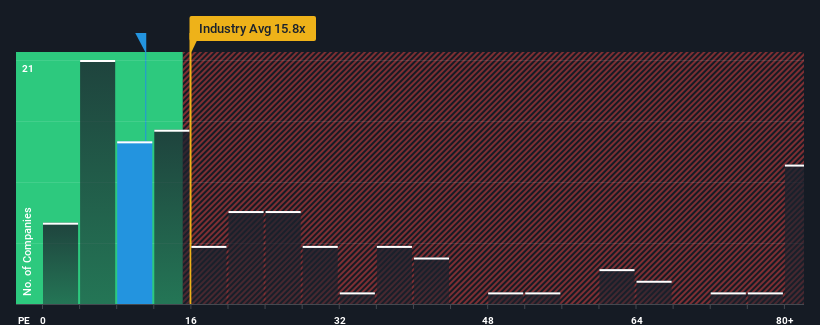- Japan
- /
- Paper and Forestry Products
- /
- TSE:3861
Oji Holdings Corporation (TSE:3861) Doing What It Can To Lift Shares

Oji Holdings Corporation's (TSE:3861) price-to-earnings (or "P/E") ratio of 11x might make it look like a buy right now compared to the market in Japan, where around half of the companies have P/E ratios above 15x and even P/E's above 24x are quite common. Although, it's not wise to just take the P/E at face value as there may be an explanation why it's limited.
Oji Holdings hasn't been tracking well recently as its declining earnings compare poorly to other companies, which have seen some growth on average. It seems that many are expecting the dour earnings performance to persist, which has repressed the P/E. If you still like the company, you'd be hoping this isn't the case so that you could potentially pick up some stock while it's out of favour.
See our latest analysis for Oji Holdings

Does Growth Match The Low P/E?
The only time you'd be truly comfortable seeing a P/E as low as Oji Holdings' is when the company's growth is on track to lag the market.
Retrospectively, the last year delivered virtually the same number to the company's bottom line as the year before. However, a few strong years before that means that it was still able to grow EPS by an impressive 63% in total over the last three years. Accordingly, shareholders would have probably welcomed those medium-term rates of earnings growth.
Looking ahead now, EPS is anticipated to climb by 12% per year during the coming three years according to the five analysts following the company. Meanwhile, the rest of the market is forecast to expand by 11% each year, which is not materially different.
In light of this, it's peculiar that Oji Holdings' P/E sits below the majority of other companies. It may be that most investors are not convinced the company can achieve future growth expectations.
The Final Word
Generally, our preference is to limit the use of the price-to-earnings ratio to establishing what the market thinks about the overall health of a company.
Our examination of Oji Holdings' analyst forecasts revealed that its market-matching earnings outlook isn't contributing to its P/E as much as we would have predicted. When we see an average earnings outlook with market-like growth, we assume potential risks are what might be placing pressure on the P/E ratio. It appears some are indeed anticipating earnings instability, because these conditions should normally provide more support to the share price.
You should always think about risks. Case in point, we've spotted 1 warning sign for Oji Holdings you should be aware of.
It's important to make sure you look for a great company, not just the first idea you come across. So take a peek at this free list of interesting companies with strong recent earnings growth (and a low P/E).
New: AI Stock Screener & Alerts
Our new AI Stock Screener scans the market every day to uncover opportunities.
• Dividend Powerhouses (3%+ Yield)
• Undervalued Small Caps with Insider Buying
• High growth Tech and AI Companies
Or build your own from over 50 metrics.
Have feedback on this article? Concerned about the content? Get in touch with us directly. Alternatively, email editorial-team (at) simplywallst.com.
This article by Simply Wall St is general in nature. We provide commentary based on historical data and analyst forecasts only using an unbiased methodology and our articles are not intended to be financial advice. It does not constitute a recommendation to buy or sell any stock, and does not take account of your objectives, or your financial situation. We aim to bring you long-term focused analysis driven by fundamental data. Note that our analysis may not factor in the latest price-sensitive company announcements or qualitative material. Simply Wall St has no position in any stocks mentioned.
About TSE:3861
Oji Holdings
Engages in the pulp and paper business in Japan and internationally.
Established dividend payer with mediocre balance sheet.
Similar Companies
Market Insights
Community Narratives




